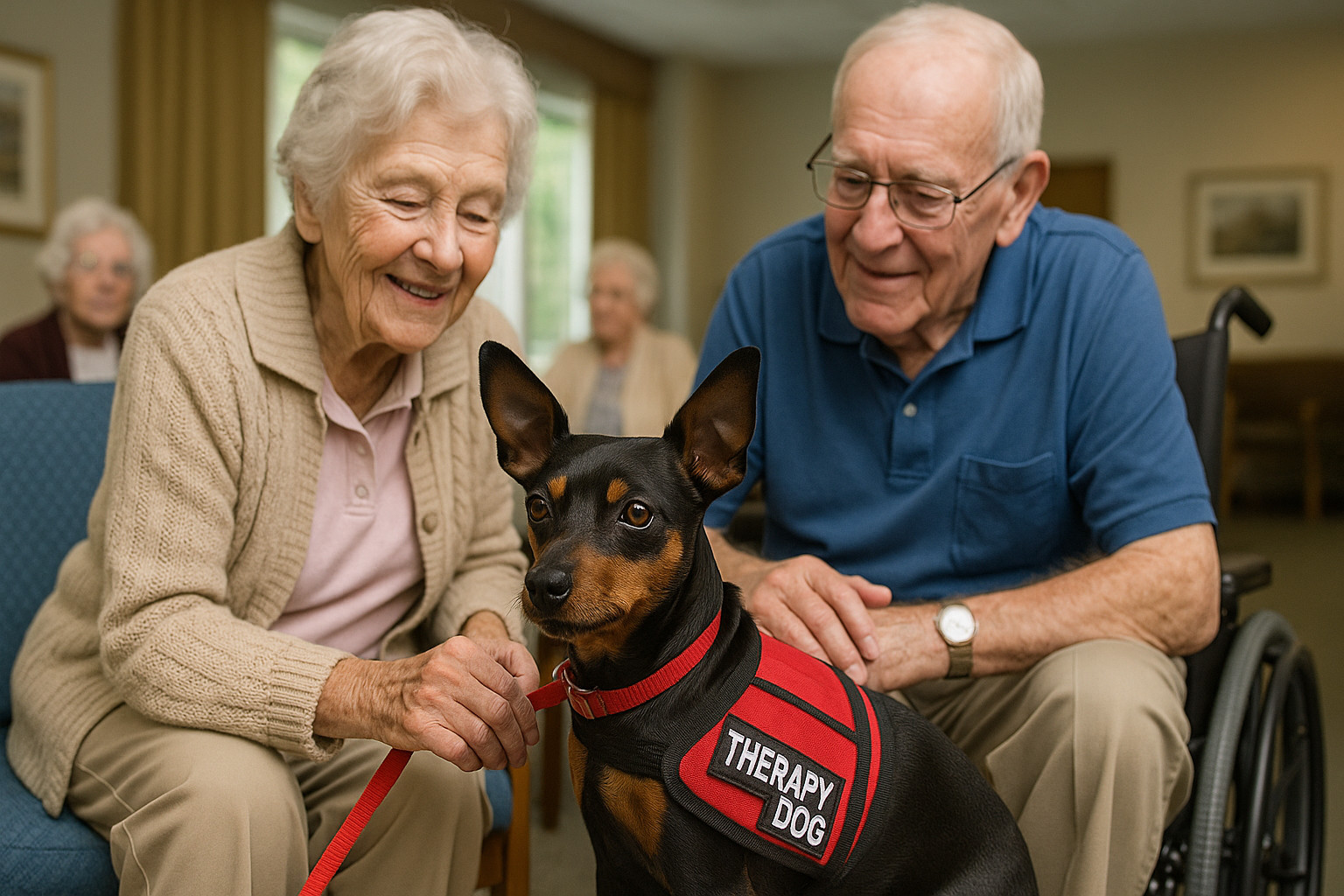Miniature Pinscher as a Therapy Dog

Miniature Pinscher as a Therapy Dog Overview
The Miniature Pinscher, often affectionately called the "Min Pin," is a small breed with a large presence. Known for their spirited personalities and sharp intelligence, these dogs can captivate anyone who crosses their path. While not the first breed that comes to mind for therapy work, Miniature Pinschers can make effective therapy dogs given their natural affinity for social settings, coupled with proper training and care.
Understanding the Therapy Dog Role
Therapy dogs provide emotional support and comfort to individuals in hospitals, schools, and other therapeutic settings. Unlike service dogs trained to perform specific tasks for a single individual, therapy dogs interact with multiple people and need to adapt quickly to different human emotions and environments. The success of a therapy dog hinges largely on temperament, social intelligence, and adaptability.
Physical Appearance and Energy Level
Miniature Pinschers are compact, with a well-defined musculature that suggests agility and strength despite their small stature. Their lively demeanor and sleek coats make them visually appealing, offering a sense of cheerfulness. This breed's high energy levels need to be managed, especially in settings that require calmness and composure. Therefore, regular exercise is crucial to ensure they channel their energy positively during therapy visits.
Personality and Emotional Intelligence
The Miniature Pinscher’s natural curiosity and alertness are advantageous in therapy settings. Their keen awareness allows them to sense human emotions, adapting their behavior to provide comfort. These dogs are often described as fearless and spirited, which can be calming for individuals needing assurance. However, their independence and occasional stubbornness necessitate firm but gentle guidance to maintain their focus during therapy activities.
Environments Where Miniature Pinscher Excels
Miniature Pinschers thrive in lively environments due to their energetic nature. They perform well in interactive settings like schools or recreational therapy sessions where their playfulness is an asset. While their small size makes them suitable for sitting on laps, their exuberant energy is best suited for environments that allow moderate activity and engagement.
Common Therapy Settings
Typical therapy settings where Miniature Pinschers excel include:
- Schools: Their playful nature can engage children effectively, providing both educational and social benefits.
- Assisted Living Facilities: Their small size and adaptability make them safe for interacting with elderly individuals.
- Rehabilitation Centers: Miniature Pinschers’ active demeanor can motivate patients during physical exercises or recovery activities.
Interactions with Different Populations
The Miniature Pinscher's interactions with diverse populations highlight its versatility as a therapy dog:
- Children: Their playful attitude and resilience can captivate children, especially in learning or play therapy sessions.
- Elderly Individuals: Their size and spirited nature make them approachable and delightful companions in assisted living situations.
- Patients in Recovery: Their energetic presence can inspire motivation, promoting physical activity and emotional healing.
Health and Wellness Factors
Being small and lightweight favors their ease in maneuvering spaces, such as tight hallways in hospitals. However, like all breeds, they have specific health considerations. They are prone to conditions like patellar luxation and progressive retinal atrophy, so regular veterinary check-ups are essential to maintain their health. These issues, if not managed, can limit their ability to engage in therapy visits.
Lifespan and Common Health Issues
Miniature Pinschers have an overall lifespan of 12 to 16 years. This longevity can be advantageous for establishing long-term therapy bonds. Common health concerns such as obesity and dental issues require proactive care, ensuring they remain in optimal health to safely and comfortably assist others.
Maintenance and Care Needs
Grooming a Miniature Pinscher is relatively low maintenance due to their short coats. However, regular brushing and nail trimming are necessary to maintain their appearance and prevent discomfort. Cleanliness is crucial for therapy dogs, as hygiene directly affects their interaction with vulnerable populations.
Training and Certification Readiness
Although intelligent, Miniature Pinschers can exhibit a stubborn streak, requiring patient and consistent training approaches. They respond well to positive reinforcement, which is vital for developing the reliable behaviors required in therapy work. Certification involves assessing their ability to obey commands and react appropriately to sudden stimuli or unpredictable environments.
Learning Style and Responsiveness
Miniature Pinschers are quick learners, exhibiting a desire to understand and please, especially when training is engaging and varied. Their responsiveness to emotional cues enhances their ability to provide support in therapy settings. Training should focus on reinforcing social manners and curbing excessive vocalization, a common trait that could disrupt therapeutic environments.
Handling Social and Emotional Stimuli
This breed's sensitivity to emotional cues makes them adept at offering companionship. They can detect changes in mood or stress levels, adjusting their interactions accordingly to provide comfort. Proper socialization from a young age boosts their confidence and adaptability, preparing them to handle various stimuli effectively.
Strengths, Limitations, and Ideal Roles for Miniature Pinschers
Strengths of the Miniature Pinscher include their engaging personality and ability to form strong bonds with people. Limitations stem from their high energy and occasional willfulness, necessitating an owner or handler who can provide firm yet compassionate direction. Ideal roles focus on settings that match their spirited nature with interactive and dynamic environments.
Final Thoughts
Miniature Pinschers can undoubtedly serve as effective therapy dogs, given their unique blend of energy, social intelligence, and adaptability. By recognizing their limitations and leveraging their strengths, they can bring significant emotional relief and joy to numerous therapy environments.
Key Takeaways for the Miniature Pinscher as a Therapy Dog
- Best suited for: Active settings like schools and rehabilitation centers
- Not ideal for: Extremely quiet or highly restrictive environments due to their energetic nature
- Temperament highlights: Playful, alert, and empathetic
- Care and health notes: Regular exercise and health check-ups to manage potential health issues
- Therapy environments where they shine: Schools, assisted living facilities, and recovery centers











